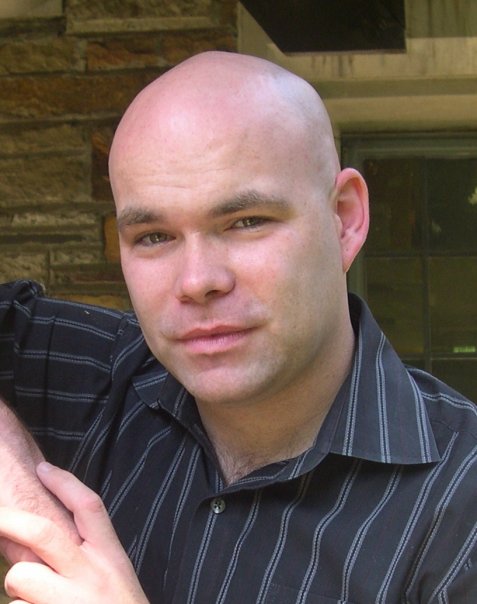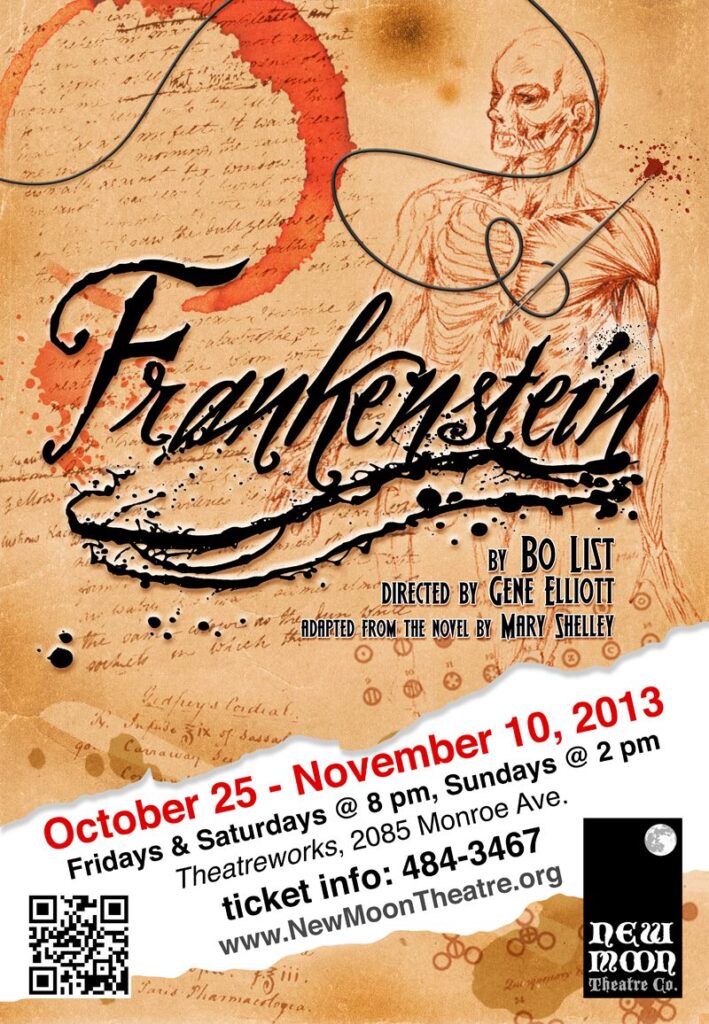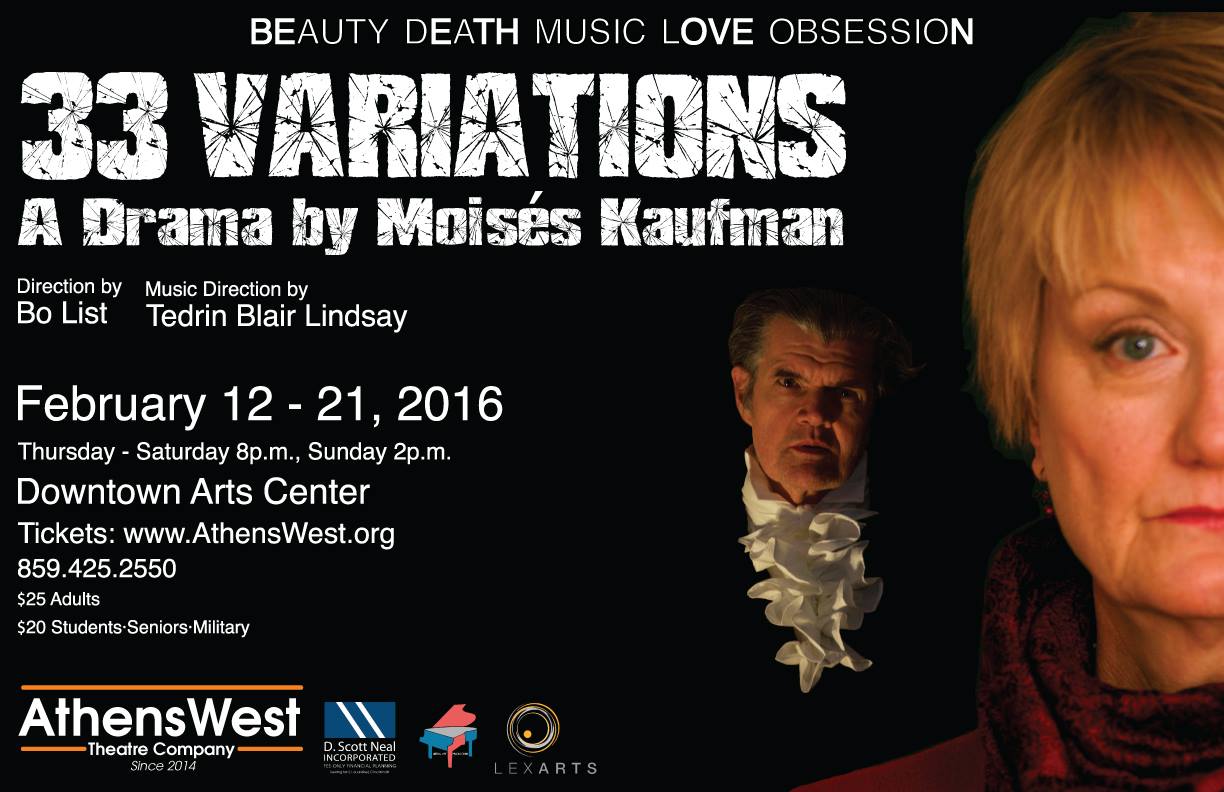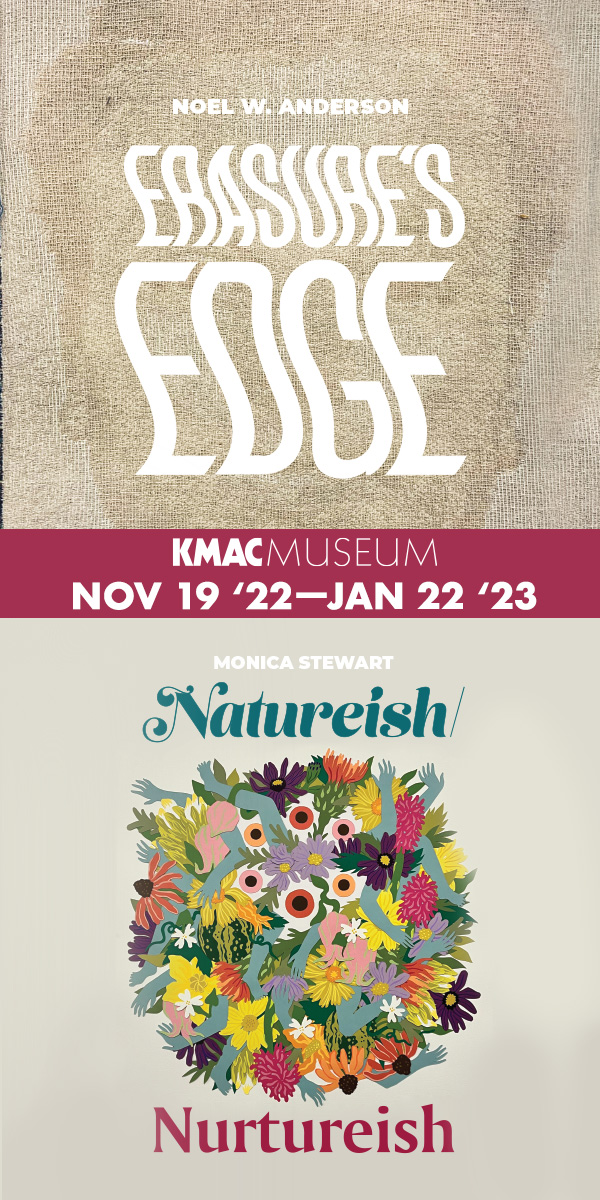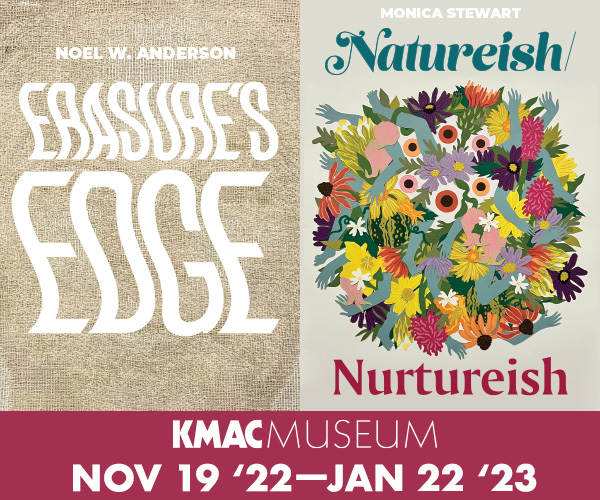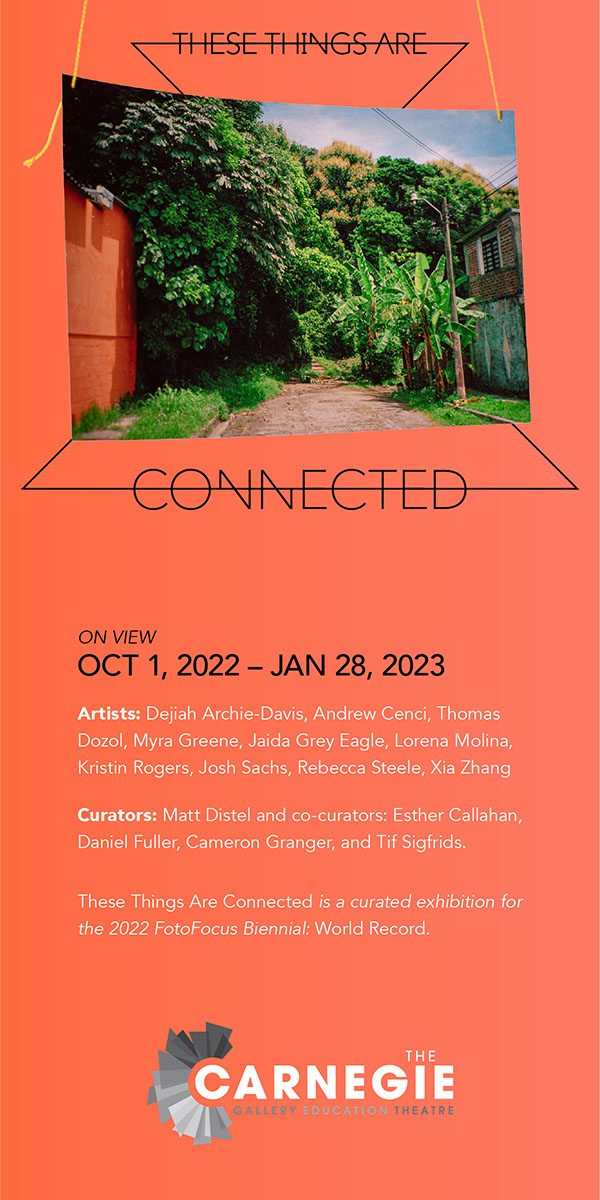For you theatre buffs out there, the sold-out performances of 33 Variations have been generating a lot of buzz for Athens West, Lexington’s newest theatre company in the Downtown Arts Center. Bo List, the director of the show and a partner in the newly-formed group, has come a long way since his early days growing up in Lexington, where he first discovered and nurtured his love of the empty space. Here to talk with us about the new show, his influences, and the transformative possibilities of theatre, is Bo List.
UM: So, it all started here in Lexington for you?
BL: Yes, I grew up here in the Bluegrass.
UM: When did your life first start to turn toward theatre?
BL: I didn’t do any theatre in high school. I was a shy kid in grade school, so by the time I got to high school, I was happy to be quiet and left alone. I was grateful to be invisible. I didn’t pop out of my shell, but something said to me that I had something to say.
UM: This was at Henry Clay?
BL: Yes. I attended Henry Clay, then went on to UK for Theatre. I decided to take an acting class at UK and a teacher said they were going to do a directing class. I said I would like to be a part of it. A lot of my venturing into theatre was from the desire to not be shy anymore. Theatre has given me the skills to speak up.
UM: Was it then when you decided Theatre was the right major for you?
BL: Well, I realized I like to be near the center of attention, but not right at the center. When I was at UK, I started out thinking acting was the way to go. Not many people enter theatre thinking they want to write or direct. Once I directed and wrote a few things, I realized that’s where I needed to be. Some of the earliest shows I saw were from Joe Ferrell. The local pros inspired me. They made it this wondrous thing that I could never quite achieve. Equus. Debra Hensley and Debra Martin doing the Kathy and Mo Show. These got me off my butt and made me want to do what they were doing.
UM: But you were still dipping into acting, you were still in some performances.
BL: Sure, even nowadays. Every few years people will bully me into being in something. My last thing was a reality TV-host/judge. Every now and then you have to decide that you have to experience being told what to do. Actors have feelings and an ego and they don’t like to be bullied. It’s important to remember that if you spend most of your time writing and directing.
UM: Was it right after UK when you decided graduate work was the right direction?
BL: Yes. I moved to Memphis to pursue an MFA in Directing. They have a great program there. Memphis helped me to develop and make quality theatre. When I finished my undergrad, I felt like I could do this. In Grad school I realized there’s a world of possibilities, techniques and styles. I was improved as an artist in my training there.
UM: Was there something of getting away from the familiar?
BL: Perhaps. I had to go away to find people of like minds, as not many people in Lexington wanted to direct at the time.
UM: It seems people in theatre have to be willing to sacrifice.
BL: I’m fortunate, as I’m not financially motivated. By that I mean, I’m a smart guy. I probably could be president of a bank or something like that, but it simply holds no interest for me. So I feel content doing what I do, being motivated by theatre as I am.
UM: Being away must’ve had a strong impact on you. Not just from the grad school perspective, but you were in totally different environments from Lexington.
BL: I floated around Chicago, Memphis and here. I took advantage of the great Usher program at Steppenwolf in Chicago. I saw Lexington actor Michael Shannon play there. Probably the best acting I’ve ever seen, right in front of me. Really superlative theatre artists. You can see theatre in a huge space one night and you can see something in a room the size of a bathroom the next. The variety is immense. They can spend $5 on a set or a million on it and there’s always something enriching from the experience.
UM: What was it that made you move back to Lexington after these experiences?
BL: I had always wanted a strong theatre scene for Lexington and after years and years and years, I finally realized that if I ever wanted to have good theatre here, I would have to create it. I’d had a front-row seat in seeing how theatre improves the quality of people’s lives. I always had a notion that if something got off the ground and started moving up and kept moving up that you would see a lot of other things flourishing as well. I thought that if some of these companies could make a go of it, we’d see a lot more synergy in the area. Fortunately, Athens is already creating opportunities for actors and out-of-town artists to come in and add to the culture.
UM: Outside of Athens West, you’ve done quite a bit of writing. How did your adaptation of FRANKENSTEIN come about?
BL: When Trish Clark ran the Lexington Shakespeare Festival she used to ask what we should do for our seasons. This went on for years and Shakespeare came and went and then one year she asked me about it again when they were doing a Season of Monsters. We talked about Frankenstein. I said to Trish she should commission me to write it. She told me I’d have to start writing quickly as there wasn’t much time before the season. It’s a beautiful book. It pops right off the page.
UM: Did you find it was popular as a stage play before you got ahold of it?
BL: There were tons of adaptations and they were all terrible, in my opinion. So I started to think about what I was looking for in this adaptation. It needs to have heart with the creature being articulate.
UM: And after the season you were able to publish it?
BL: Yes. Every writer dreams of being published. Of course, publishers are not interested in your work unless it’s been produced or unless you’re famous. I started mailing it off to theaters and got them to produce it. A friend of mine in Chicago works at a theatre that only does literary adaptations; they produced it. So my time of networking and making connections helped a bit – friends who own theaters, etc. But even with knowing people, it’s really an issue of material being good. If it’s not, it doesn’t matter who you know or who produces work.
UM: When I spoke with Kevin Hardesty, we talked about you writing for the Humanities Council.
BL: Yes, I was commissioned to write the two Chautauqua pieces that Kevin is performing currently, one on Jefferson Davis and one on Daniel Boone.
UM: How did they develop?
BL: Trish once again. She had been performing the Mary Todd Lincoln piece for Humanities and they wanted to commission these other pieces. I really liked the idea of telling a story, especially historical pieces like these. When I got to know Jefferson Davis, I really began to like him and I wanted to tell his story in a very fair way. The Humanities Council owns the pieces while they’re under contract and there are a bunch of traveling performances yet to come. Kevin’s great in them.
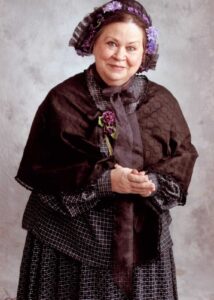
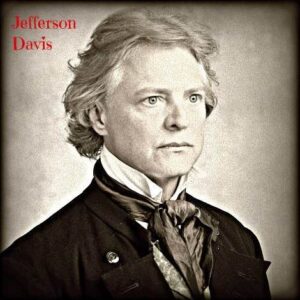
UM: Did you feel the burden of the figures being so local and so historical?
BL: Yes. There was good and bad in both characters and it was really about getting honest impressions of them.
UM: People do tend to immediately go to the worst thing with characters, don’t they? Whether historical or not.
BL: Yes, and it’s more about giving the character a truthful and tasteful rendition.
UM: How did Athens get rolling?
BL: Myself, Mark Mozingo, Jeff Day, Kate Goodwin, and Meredith Nelson all got together and discussed our vision of how things could work. For us it involved many meetings in coffee shops with people to get our Equity status.
UM: What was that process like?
BL: We called Equity and they were delighted to have a presence in Lexington. There are not a lot of opportunities in Kentucky for Equity actors.
UM: Do you feel there’s a reason it’s been so seemingly difficult to develop Equity theaters in this region?
BL: Being able to identify the needs of the area is important. We announced ourselves as a company and there was never any intention of coming in to fill a niche that other companies were leaving behind. There were always things in the Lexington Theatre scene in the past that probably hampered progress. The undeniable cliquishness in the community in the past. We’re just trying to rise above whatever did or did not happen before and do the best work we can do. We want more good theatre in this town. If there are two professional theaters in town, there’s more for everybody.
UM: Do you feel the climate’s changed politically, socially, economically?
BL: Yes. It’s no coincidence that a lot of the arts community has improved under Jim Gray’s watch as mayor.
UM: There’s an issue of good theatre happening at the right time. A confluence of influences.
BL: Yes.
UM: Then there’s just the ability to deliver a sheer number of performances. You have, what, three this season?
BL: Yes. We’ll do three next season, too. We’re slated to do four shows the season after next, so we’re growing.
UM: Do all of the shows fit nicely into the Downtown Arts Center location, or is that a consideration?
BL: Athens has certain limitations. Where we are is limited for our purposes, as there are many other things going on there. We roundtable all of the shows and decide on what would be best, what fits for what is going on socially, politically, etc. In the future we’d like to have more of a unifying thread. The three pieces we have this season are rather disparate, though timely, each in its own way.
One reason we did To Kill a Mockingbird earlier this season is because it was timely for ongoing hot topics in the news and Harper Lee’s new book.
UM: How did the current production, 33 Variations come about?
BL: 33 was on Broadway back in 2009. Moisés Kaufman, who did The Laramie Project, wrote the piece. Laramie was a play near and dear to me, and this newer piece of Kaufman’s is fantastic in a different way. I missed seeing it on Broadway, which I regret deeply, as it would have been a unique experience I’m not going to get again. It’s a hard play to read and there’s a lot of music that coincides with the onstage performances.
UM: Janet Scott is in the fictional role of musicologist Katherine Brandt with Robert Parks Johnson as Beethoven. And Tedrin Blair is doing the music for the show?
BL: Yes! I thought to myself: wouldn’t it be wonderful if Tedrin could do it? It’s so theatrical, so vibrant when you’re in the room. I had no idea if he would step on board, but he did and it’s wonderful.
UM: How have audience responses been?
BL: We sold out opening night and almost sold out the following two performances. It’s a drama, a downer, very serious work, but compelling. I don’t know if it’s because of Mockingbird’s run, or Tedrin or whatever. I hope it’s because there’s an appetite for good, serious, new and interesting work. We’re inventing this as we go along.
UM: Surely you must need to unwind from the intensity of the work.
BL: I’ve been doing a lot of 30 Rock lately. I go to the Re-Store. I collect ugly old lamps. Being in a place where my brain is occupied with other stuff is essential at times.

33 Variations finishes its run this week, running February 18th through the 21st, with evening shows at 8pm and a 2pm matinee on Sunday. Find out more about the show, tickets, and Athens West next season at: athenswest.org, or call (859)425-2550.

